新人教版七年级下册英语Unit3-3
Unit3Section+A+2e-3c++课件2023-2024学年人教版七年级英语下册
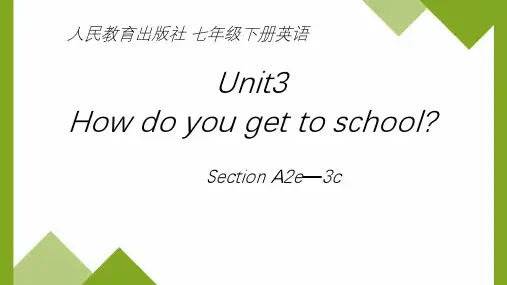
Unit3 How do you get to school?
Section A2e—3c
How does he go to work?
He takes the bus to work. = He goesto work by bus. = He goesto work on a bu.s
How does he get to school?
Hschool
o.n foot
How does she get home?
She takes a carto get home.
=She gets home =She gets home
by .car in a. car
How long does it take? It takes 25 minutes.
How long
25 minutes
2e Role-play the conversation.
1. Who usually takes the bus to school?
Lisa.
2. How does Jane get to school? She rides her new bike to school.
Who Liu Xing
How bus
How far
about 14 kilometers
How does Liu Xing get to school? He takes the bus to school. How far is it from his home to school?
It’s about 14 kilometers.
Then answer the questions.
人教版七年级英语下册Unit3 整体课件 78张
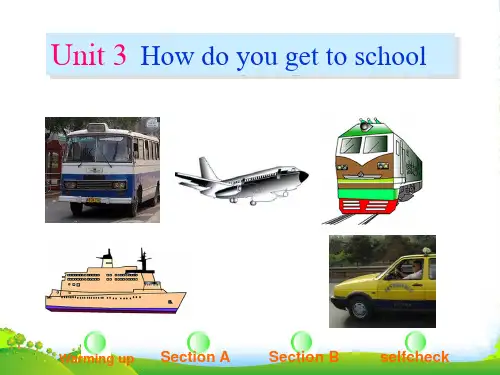
2) “by+交通工具”属固定介词短语,表 示“乘坐、使用某种交通工具”。如:
by bus 乘公交车 by train 坐火车 by bike 骑自行车 by air 坐飞机 by boat 乘船 请注意,英语中on foot表示“步行;走 路”,而不是by foot或on feet.
I take。。。。
He takes。。。。
moon
How long does it take you to school? It takes me 10 minutes to get to school by bus.
10 minutes 25 minutes 8 minutes
How long does it take you to school? It takes me 10 minutes to get to school by bus.
Unit 3 How do you get to school
Warming up Section A
Section B
selfcheck
take the train take the plane take the subway ride a bike
How do you get to Beijing? I ______to Beijing.
3) (指方式、方法)怎样,怎么 How did you climb to the top of that building? 你是如何爬上楼顶的? How do you get to school? 你是如何去学校的?
4) 用于惊叹句中,表示多么、何等。 How well you look! 你看起来多么健康啊! How I wish to have a long vacation these days! 这些天我多么希望去度一次长假啊!
Unit3重难点讲解与练习人教版七年级英语下册
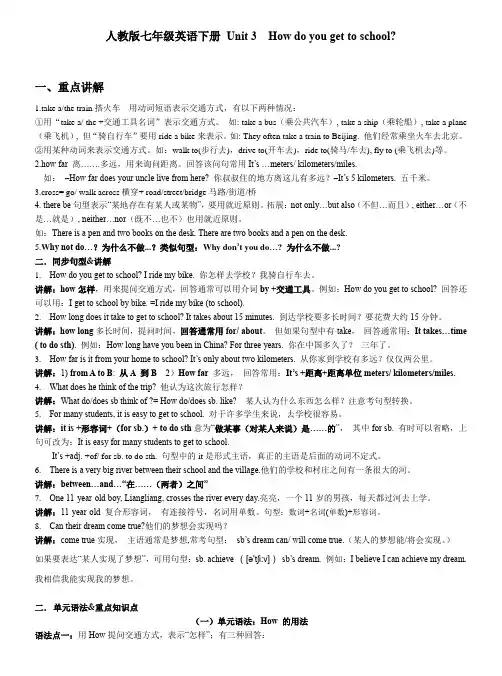
人教版七年级英语下册Unit 3 How do you get to school?一、重点讲解1.take a/the train搭火车用动词短语表示交通方式,有以下两种情况:①用“take a/ the +交通工具名词”表示交通方式。
如: take a bus(乘公共汽车), take a ship(乘轮船), take a plane (乘飞机), 但“骑自行车”要用ride a bike来表示。
如: They often take a train to Beijing. 他们经常乘坐火车去北京。
②用某种动词来表示交通方式。
如:walk to(步行去),drive to(开车去),ride to(骑马/车去), fly to (乘飞机去)等。
2.how far 离…….多远,用来询问距离。
回答该问句常用It’s …meters/ kilometers/miles.如:–How far does your uncle live from here? 你叔叔住的地方离这儿有多远?–It’s 5 kilometers. 五千米。
3.cross= go/ walk across横穿+ road/street/bridge马路/街道/桥4. there be句型表示“某地存在有某人或某物”,要用就近原则。
拓展:not only…but also(不但…而且), either…or(不是…就是), neither…nor(既不…也不)也用就近原则。
如:There is a pen and two books on the desk. There are two books and a pen on the desk.5.W hy not do…?为什么不做...?类似句型:Why don’t you do…? 为什么不做...?二.同步句型&讲解1.How do you get to school? I ride my bike. 你怎样去学校?我骑自行车去。
人教版七年级英语下册Unit3_单元要点梳理总结
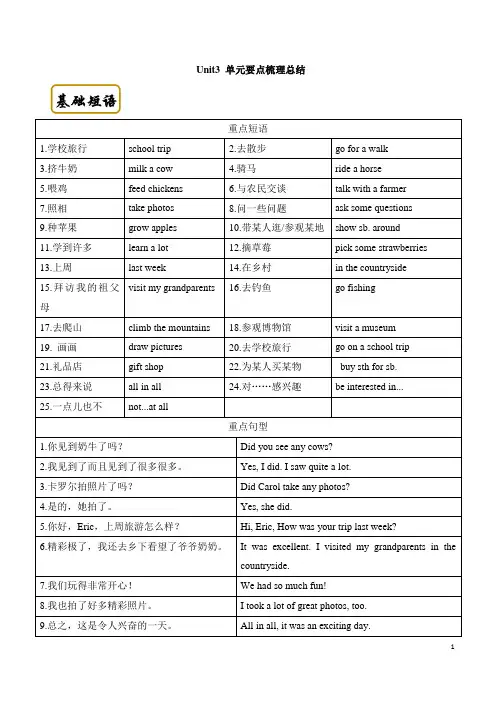
Unit3 单元要点梳理总结重点短语1.学校旅行school trip2.去散步go for a walk3.挤牛奶milk a cow4.骑马ride a horse5.喂鸡feed chickens6.与农民交谈talk with a farmer7.照相take photos 8.问一些问题ask some questions9.种苹果grow apples 10.带某人逛/参观某地show sb. around11.学到许多learn a lot 12.摘草莓pick some strawberries13.上周last week 14.在乡村in the countrysidevisit my grandparents 16.去钓鱼go fishing15.拜访我的祖父母17.去爬山climb the mountains 18.参观博物馆visit a museum19. 画画draw pictures 20.去学校旅行go on a school trip21.礼品店gift shop 22.为某人买某物buy sth for sb.23.总得来说all in all 24.对……感兴趣be interested in...25.一点儿也不not...at all重点句型1.你见到奶牛了吗?Did you see any cows?2.我见到了而且见到了很多很多。
Yes, I did. I saw quite a lot.3.卡罗尔拍照片了吗?Did Carol take any photos?4.是的,她拍了。
Yes, she did.5.你好,Eric,上周旅游怎么样?Hi, Eric, How was your trip last week?6.精彩极了,我还去乡下看望了爷爷奶奶。
It was excellent. I visited my grandparents in thecountryside.7.我们玩得非常开心!We had so much fun!8.我也拍了好多精彩照片。
[全]人教版七年级英语下册unit3单词、知识梳理、词汇句型精讲
![[全]人教版七年级英语下册unit3单词、知识梳理、词汇句型精讲](https://uimg.taocdn.com/423f4bb2f5335a8102d220e1.webp)
人教版七年级英语下册unit3单词、知识梳理、词汇句型精讲Unit3 How do you get to school?1Unit 3单词(音标)train [tren] n.火车bus [bs] n.公共汽车;公交车subway ['sbwe] n.地铁take the subway 乘地铁ride [rad] v.骑n.旅程bike [ba k] n. 自行车ride a bike 骑自行车sixty ['skst] num.六十seventy ['sevnt] num.七十eighty ['et] num.八十ninety['nant] num.九十hundred ['hndrd] num.一百minute['mnt] n.分钟far [fɑ] adv. & adj. 远;远的kilometer ['kl,mit(r)] n.公里new [nju] adj. 新的;刚出现的every ['evr] adj. 每一;每个every day 每天by [ba] prep. (表示方式)乘(交通工具)by bike 骑自行车drive [drav] v. 开车car [kɑ] n.小汽车;轿车live[lv] v. 居住;生活stop [stɑ:p][stp] n. 车站;v. 停止think of 认为cross [krs] v.横过;越过river ['rv] n.河;江many ['men] adj. & pron.许多village ['vld] n.村庄;村镇between [b'twin] prep.介于…之间between…and…在……和……之间bridge [brd] n.桥boat [bt] n.小船ropeway ['rpwe] n.索道year [j] [ j] n.年;岁afraid ['fred] adj.害怕;惧怕like [lak] prep.像;leave [liv] v.离开dream [drim] n.梦想;睡梦v.做梦true [tru] adj.真的;符合事实的come true实现;成为现实Dave[deiv] 戴夫(男名2 Unit3 知识梳理◆短语归纳1. get to school 到达学校2. take the subway 乘地铁3. ride a bike 骑自行车4. how far 多远5. from home to school 从家到学校6. every day 每天7. take the bus 乘公共汽车8. by bike 骑自行车9. bus stop 公共汽车站10. think of 认为11. between…and…在…和…之间12. one 11-year-old boy 一个11岁的男孩13.play with…和…玩14. come true 实现15. have to 不得不◆用法集萃1. take…to…= go to…by…乘…去…2. How do/does sb get to…? 某人是怎样到…的?3. How far is it from…to…? 从…到…有多远?4. It takes sb. some time to do sth. 做某事花费某人多长时间。
新人教版七年级英语下册Unit3词汇与句型
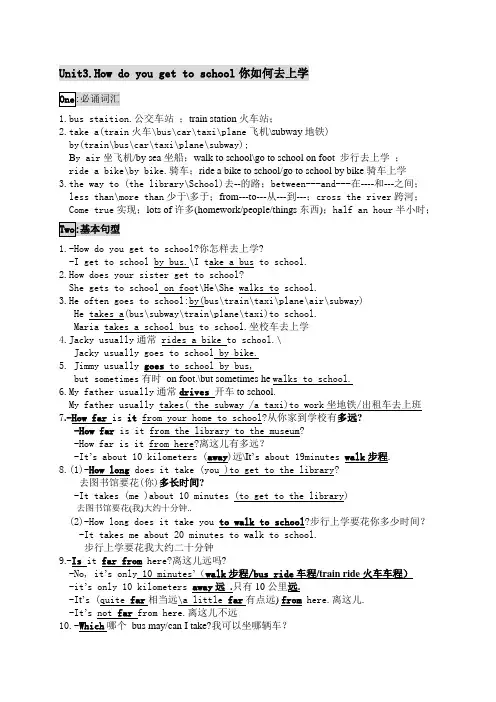
Unit3.How do you get to school你如何去上学1.bus staition.公交车站;train station火车站;2.take a(train火车\bus\car\taxi\plane飞机\subway地铁)by(train\bus\car\taxi\plane\subway);B y air坐飞机/by sea坐船;walk to school\go to school on foot 步行去上学;ride a bike\by bike.骑车;ride a bike to school/go to school by bike骑车上学3.the way to (the library\School)去--的路;between---and---在----和---之间;less than\more than少于\多于;from---to---从---到---;cross the river跨河;Come true实现;lots of许多(homework/people/things东西);half an hour半小时;1.-How do you get to school?你怎样去上学?-I get to school by bus.\I take a bus to school.2.How does your sister get to school?She gets to school on foot\He\She walks to school.3.He often goes to school:by(bus\train\taxi\plane\air\subway)He takes a(bus\subway\train\plane\taxi)to school.Maria takes a school bus to school.坐校车去上学4.Jacky usually通常 rides a bike to school.\Jacky usually goes to school by bike.5. Jimmy usually goes to school by bus,but sometimes有时on foot.\but sometimes he walks to school.6.My father usually通常drives 开车to school.My father usually takes( the subway /a taxi)to work坐地铁/出租车去上班7.-How far is it from your home to school?从你家到学校有多远?-How far is it from the library to the museum?-How far is it from here?离这儿有多远?-It’s about 10 kilometers (away)远\It’s about 19minutes walk步程.8.(1)-How long does it take (you )to get to the library?去图书馆要花(你)多长时间?-It takes (me )about 10 minutes (to get to the library)去图书馆要花(我)大约十分钟..(2)-How long does it take you to walk to school?步行上学要花你多少时间?-It takes me about 20 minutes to walk to school.步行上学要花我大约二十分钟9.-Is it far from here?离这儿远吗?-No, it’s only 10 minutes’(walk步程/bus ride车程/train ride火车车程)-it’s only 10 kilometers away远.只有10公里远.-I t’s (quite far相当远\a little far有点远) from here.离这儿.-It’s not far from here.离这儿不远10.-Which哪个bus may/can I take?我可以坐哪辆车?-You can take No.5 bus there.你可以做5路车去那儿。
人教版七年级英语下册unit3(详细内容)
人教版七年级英语下册Unit 3 How do you get to school一、单词回顾1、train[treɪn]火车2. bus 公交车3、subway['sʌbweɪ]地铁4、ride[raɪd]v.骑n.旅rode. [rəʊd]ridden.['rɪdn.]5、bike[baɪk]自行车6、sixty['sɪkstɪ]六十7、seventy['sev (ə)ntɪ]七十8、eighty['eɪtɪ]八十9、ninety['naɪntɪ]九十10、hundred['hʌndrəd]一百11、far[fɑː]很12、minute['mɪnɪt]分钟13、kilometer['kɪlə,mitɚ]公里14、new[n juː]新的15、every ['evrɪ]每一个16、by[baɪ]通过,被17、drive[draɪv]开车18、live [lɪv]活的,生动的19、stop[stɒp]停止20、cross[krɔs]交叉21、river ['rɪvə]河,江22、many ['menɪ]许多23、village[' vɪlɪdʒ]村庄,村民24、between[bɪ'twiːn]介于…之间25、bridge[brɪdʒ]桥26、boat [bəʊt]小船27、ropeway['rop,we]n. 索道空中缆索28、year[jɪə]n. 年;年度;岁29、afraid[ə'freɪd]害怕;惧怕30、like [laɪk]像;怎么样(介词)31、leave [liː v]离开;left (lea ve的过去式)32、dream[driːm]梦想;睡梦33、true[truː]真的;符合实际的二. 词汇辨析:1. take/spend/pay/costspend,cost,take和pay都可以表示“花费”,但用法却不尽相同。
Unit3 SectionA 2d-3c课件 2022-2023学年人教版英语七年级下册
用两种方式翻译下列各句。 1. 吉姆每天步行去上学。
Jim w__a_lk__s _t_o_ _s_c_h_o_o_l every day. Jim g_o_e_s_ _to__s_ch__o_o_l _o_n_f_o_o_t_every day. 2. 我们通常乘公共汽车去市里。 We usually _t_a_k_e _th_e_ _b_u_s_ to the city. We usually go to the city _b_y_b_u_s_. 3. 露西骑自行车去公园。 Lucy _ri_d_e_s _h_e_r _b_ik_e_ to the park. Lucy goes to the park b_y__b_i_k_e_.
另外help 与out 之间还可以加具体的人, 如:Can ou help me out?
你能帮我一把吗? They helped (us) out with the clean-up. 他们帮助我们做大扫除。
2. at least 至少 e.g. We should brush our teeth at least twice a day.
3. school/your/from/it/is/how far/home/to __H_o_w__f_a_r_i_s_i_t_f_r_o_m__y_o_u_r_h_o_m__e_t_o_s_c_h_o_o_l_____? __I_t’_s_a_b_o_u_t__tw__o_k_i_lo_m__e_t_e_rs_.________________ 4. you/to/walk/do/school __D__o_y_o_u__w_a_l_k_t_o__sc_h_o_o_l___________________?
3. it takes sb. some time to do sth. 意为:_做__某__事__花__费__某__人__…__…__时__间______ 步行大约要花我15 分钟的时间。 _It__ta_k_e_s__m_e__a_b_o_u_t_1_5__m_i_n_u_t_es__to__w_a_l_k_._ 做作业大约花费简30分钟的时间。 _I_t _ta_k__es__J_a_n_e_a_b_o_u_t__3_0_m__in_u__te_s_t_o__d_o_h_er _h_o_m__e_w_o_r_k_._______________________
人教版七年级英语下册Unit 3知识点归纳总结和练习(含答案)
Unit 3 How do you get to school?一、词汇集锦train ________ bus _______ subway ________ take the subway ________ride ________ bike _______ ride a bike ________ sixty ________ seventy _________ eighty ________ ninety ________ hundred _______ minute ________ far _________ kilometer ________ new ________ every _______ every day ________ by _______ by bike _______ drive ________ car _________ live_______ stop _______ think of _______cross ________ river ________ many _______ village _______ between _________ between…and…____________ bridge ________ boat ________ ropeway ________ year __________ afraid________ like _______ villager _________ leave ___________ dream ________ true ____________ come ture _______二、短语归纳1. get to school 到达学校2. take the train 乘火车3. take the subway 乘地铁4. ride a bike 骑自行车5. how do you get to school 怎么到达学校6. one hundred and five 1057. how far 多远8. how long 多长时间9. it takes sb some time to do sth 它花费某人多长时间做某事10. ride the bike to school 骑自行车到学校11. walk to , drive to ,fly to…步行去…;开车去…;坐飞机去….12. every day 每天13. I’m not sure 我不敢确信14. about= around 大约15. 10 kilometers 十公里16. good exercise 好的锻炼17. drive his car to work 开车去上班18. in his father’s car 坐父亲的车19. need about 10 minutes to get to school 需要十分钟的时间到达学校20. what do you think of…=how do you like…你觉得怎么样21. cross the river 过河22. It is easy to get to school. 到达学校很容易。
人教版七年级英语下册 Unit 3课文原文及翻译
人教版(新标准)初中英语课文原文及翻译七年级下册Unit 3Section ALanguage Goal: Talk about how to get to places语言目标:谈论怎样到达目的地-Hey. Dave. How do you get to school?嘿,戴夫。
你是怎样到学校的?-I walk.How about you,Sally?我步行。
你呢,萨莉?-I ride my bike.我骑自行车。
2e. Role-play the conversation.分角色表演对话。
Lisa: Hey, Jane. Is this your new bike?莉萨:嘿,简。
这是你的新自行车吗?Jane: Yes. I ride it to school every day. How do you get to school?简:是的。
我每天骑着它去学校。
你是怎样到学校的?Lisa: I usually take the bus.莉萨:我通常乘公共汽车。
Jane: How far is it from your home to school?简:从你家到学校有多远?Lisa: I'm not sure... about 10 kilometers? The bus ride takes about 20 minutes.How long does it take you to get to school?莉萨:我不太确定……大约10千米?乘公共汽车花费大约20分钟。
你到学校花费多长时间?Jane: About 15 minutes by bike. It's good exercise.简:骑自行车大约15分钟。
这是很好的锻炼。
Lisa: Yeah. Well, have a good day at school.莉萨:是的。
那么,祝你在学校过得开心。
Jane: You, too.简:你也是。
- 1、下载文档前请自行甄别文档内容的完整性,平台不提供额外的编辑、内容补充、找答案等附加服务。
- 2、"仅部分预览"的文档,不可在线预览部分如存在完整性等问题,可反馈申请退款(可完整预览的文档不适用该条件!)。
- 3、如文档侵犯您的权益,请联系客服反馈,我们会尽快为您处理(人工客服工作时间:9:00-18:30)。
There is much water in the bottle. 瓶子里有许多水。(much修饰不可数名 词,表量或程度。)
The boy had a lot of pocket money. 这男孩有许多零花钱。
— It’s very important _B__ us to make a
plan before a new term.
— Yes. You must try to make it carefully.
A. of
B. for
C. to
2. There is a very big river between their school and the village. 在他们的学校和乡村之间有一条大河。 between… and… 在……和……之间 例如:
Mary wants to know… ____ where Bob lives. __√__ how far he lives from his grandparents’ home. __√__ how he gets to his grandparents’ home. __√__ how long it takes to get to his grandparents’ home. ____ what he thinks of the trip.
I run back to my room and get my bag. 我奔回房间拿自己的提包。
The river runs into the sea. 这条河流入大海。
I have a bad headache and my nose runs a lot. 我头痛得很厉害,而且我的鼻涕很多。
Can you tell me the difference between Lucy and Lily?
你能告诉我露西和莉莉之间的不同吗?
— Guess, how much does it cost?
— I think it costs __B___ 15 and 20 dollars.
A. from
2)cross 作动词用,“穿过,越过”的意 思。主要表示在物体表面上横穿。如横 过马路、过桥、过河等,与go across同义。 例如:
Be careful when you cross the street. 过马路时要小心。
辨析 cross, across与through (1) across是介词,有“横跨,横穿,穿 越”之意。 例如:
The Great Green Wall is across the
northwest of China. 绿色长城横跨中国西北。
(2) through是介词,“在……之中,透过” 的意思,主要表示从物体内部穿过。如 穿过森林、隧洞等。例如:
The two friends were walking through
There are no computers in that small
mountain village. 在那个小山村里根本就没有电脑。
There is no milk in the fridge. 冰箱里没有牛奶。 2) run 表示“跑,奔;液体的流动”,在不 同语境中分别有不同的用法和含义。例如:
the forest. 这两个朋友正沿着森林走。
练习:
1. We must ___cr_o_s_s__ the road very carefully.
2. Before going ___a_c_ro_s_s__ the road, you should look left first and then right.
1d
Listen again. How does Bob get to his grandparent’ home? Check (√)1 or 2.
√1 2
1e Talk about how Bob gets to his grandparents’ home.
A: How does Bob get to his grandparents’ home?
2. They have to cross a very ___b_i_g____ river between their school and the village.
3. They cannot go by boat because the river runs too _q_u_i_c_k_l_y__.
4. What is the villagers’ dream? Do you
think their dream can come true? How? Their dream is to have a bridge. I think their dream can come true. Maybe the government can build a bridge for them.
their dream can come true? How?
1. How do the students in the village go to
school? They go on a ropeway to cross the river to school. 2. Why do they go to school like this?
How do they get to school?
1. For many students, it is easy to get to school. 对于许多学生来说,上学很容易。
1) many adj.& pron. 许多
表示“多”的意思,可用many, much, a lot of, lots of 等。但是many, much常用于否 定句和疑问句,而a lot of等则常用于肯定句。 例如:
B. between
C. among
D. with
3. There is no bridge and the river runs too
quickly for boats. (河上)完全没有桥梁,而且河水湍急,不 宜小船摆渡。 1) 此句是英语否定结构的一种。当no 用于 构成否定句,主要用于名词之前,强调否定 其后的名词,表现“完全不;根本没有。” 例如:
4. It is not to cross the river on a ropeway, but the boy is not __a_f_r_a_id__.
5. The students and villagers want to have a bridge. Can their dream come __tr_u_e__?
It’s about how the children cross a river to get to school.
2b Read the passage and answer the questions.
1. How do the students in the village go to school? 2. Why do they go to school like this? 3. Does the boy like his school? Why? 4. What is the villagers’ dream? Do you think
4. One 11-year-old boy, Liangliang, crosses
the river every school day. 亮亮,一个11岁男孩,每天过河上学。 1)11-year-old 构成一个复合形容词,修饰 名词boy。请注意其中的year之后没有复数 词尾-s。这一构词结构较为常见。例如: a four-day trip 一个四天的旅行 a 30-page book 一本30页的书 a three-room house 一个三间屋的房子
2c Read the passage again. Complete the sentences with words from the passage.
1. For the students in the village, it is _d_i_ff_i_cu__lt_ to get to school.
5. But he is not afraid. 但是他不害怕。 afraid adj. 害怕的;畏惧的
Are you afraid of snakes? 你怕蛇吗?
Children feel afraid when they are at home alone.
Unit 3 How do you get to school?
Section B Period 1 (1a-2c)
Do you know these places?
bus stop
bus station
train station
subway station
1a Match the words with the pictures.
A: How do you get to school?
B: Well, I ride my bike to the subway station. Then I take the subway.
1c Listen and check (√) that things that Mary wants to know.
A. a lot of
B. many
C. much
D. many more
2) It is + adj. (for sb.) to do sth. (对某人来说)干某事是…… 例如:
It is interesting for me to play computer
